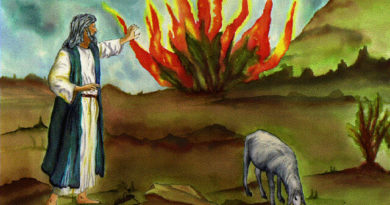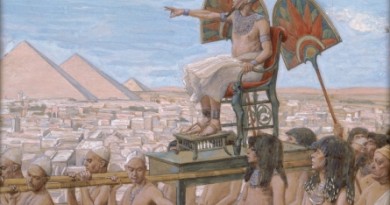Shemot 5763 – Shifra and Puah
And the king of Egypt spoke to the Hebrew midwives, and the name of one was Shifrah, and the name of the other Puah; And he said, When you do the office of a midwife to the Hebrew women, and see them upon the stools; if it is a son, then you shall kill him; but if it is a daughter, then she shall live. But the midwives feared God, and did not as the king of Egypt commanded them, but saved the male children alive. …Exodus 1:15-17
Shifrah and Puah play a critical part in the story of Moses and the redemption from Egypt. If these two midwives, Shifrah and Puah, had simply done their job—had followed orders—Moses would have been killed as soon as he was born. The rest of the story in this week’s parsha would never have happened. The destiny of the Jewish people would have been profoundly altered had Shifrah and Puah done what they were told to do.
Thank God they didn’t. When this decree came along Shifra and Puah could have taken an easy way out. They could have resigned from their jobs. If they resigned they would neither be risking the wrath of Pharaoh by not following his directions, or be faced with the distasteful task of killing babies.
However, they did not dodge the responsibility. They stayed in their jobs, defied Pharaoh’s orders, and saved Jewish babies, including Moses.
Why did they take this risk? The Torah tells us it was because they were God fearing. They had yirat Hashem, fear/awe of God.
What does it mean to be “God fearing?” The commentator Ibn Ezra tells us that Shifra and Puah were not afraid of the king of Egypt, they only feared God. Is this what it means to be God fearing? To fear ONLY God?
Rebbe Nachman teaches that there are two kinds of yirat Hashem, fear of God. The first is a fear which comes from fear of other things: fear of a wild animal, or fear of a powerful person. Ibn Ezra is saying that this is the kind of fear that Shifra and Puah had: if they were scared by Pharaoh, they were even more scared of God. However, Rebbe Nachman teaches there is another kind of yirat Hashem. One that comes from recognizing God’s exaltedness and greatness; this kind of yirah adds completeness to God’s name.
To be a God fearing person means you will put your obligations to God—your obligations to a Higher Authority—above your obligations to secular authorities. When faced with a conflict between an instruction from a boss or a government official, and a teaching from God, you will choose the teaching from God.
Resistance to an illegal order is an important principle in the Torah. The fifth commandment says to “honor your parents,” not obey your parents. While one should generally obey one’s parents, the Talmud tells us that if your parent tells you to do something wrong, to disobey the Torah, you should ignore their order. Fidelity to God’s teachings takes priority even over your parents.
This is what makes Shifra and Puah so special. Without regard to their personal safety, they did what they believed God wanted them to do. They resisted the tyranny of Pharaoh, and instead chose to do the right thing. In the 1960s the Hillel rabbi at Brandeis, Rabbi Al Axelrod, established the Shifra and Puah award, to be given annually to recognize non-violent resistance to tyranny.
This week Time magazine has chosen to give the “Person of the Year Award” to a trio of women who would also be eligible for the Shifra and Puah award. Cynthia Cooper, Coleen Rowley, and Sherron Watkins.
Like Shifra and Puah, these three women chose to rebel against authority. Cynthia Cooper exposed the accounting shenanigans at WorldCom. Coleen Rowley let Americans know that the FBI had information that could have prevented the tragedy of 9/11, but bureaucratic mismanagement led to the information not being used. Sherron Watkins revealed the elaborate and misleading accounting Enron used to inflate profits and conceal their real status from investors.
Just like Shifra and Puah, these three had no personal motive or vested interest in going against the temporal authority over them. So why did they speak out? As Cynthia Cooper put it, “there is a need for regular people to step up and do the right thing.”
For at least two of the three women that Time magazine selected, being “God-fearing” was likely a factor in their decision to speak up. Sherron Watkins, the Enron employee, is an active church goer and had her pastor sitting right behind her when she testified before a US Congressional committee. Cynthia Cooper, the Worldcom employee, is also active in her church. I couldn’t find any information on the religious background of the FBI agent Coleen Rowley, but since grew up in a small town in the Midwest, like the other two, it probably was a part of her life.
There are those who would say that these three women don’t deserve to be Time Magazine’s Persons of the Year. That there were others who were far more influential this year—Pat Buchanan suggested that Saddam Hussein should have been named Man of the Year. Similarly, I suppose there are those who would say Shifra and Puah don’t deserve to be singled out for attention in this week’s parsha—there are other “bigger players” like Moses to talk about.
However, Cynthia Cooper, Coleen Rowley, and Sherron Watkins had a huge role to play in the fact that people all over the United States and beyond are questioning the moral shortcomings of powerful corporations and organizations. Their actions will in all likelihood lead to much needed reforms in bureaucracies that have become more concerned with self-perpetuation than with doing the right thing.
And if Shifra and Puah hadn’t acted as they did, resisting authority, there would not have been any Moses and the rest of the Exodus story. We’d still be in Egypt, spiritually if not physically.
The Talmud in tractate Brachot tells us that the words of a God-fearing person are heard. We can be thankful that the words of these God-fearing women have been heard.
Cooper, Rowley, and Watkins deserve their recognition because even if Saddam Hussein may have been more influential, we desperately need them as role models. We need to let God-fearing people, people who want to do the right thing, know that they will be heard.
From all five of these women: Shifra and Puah, Cynthia Cooper, Coleen Rowley, and Sherron Watkins we can learn a lesson about courage and civil disobedience. We can learn to stand up for what is right even though it may be personally hazardous.
And that’s a lesson this world needs now more than ever.
Shabbat Shalom



